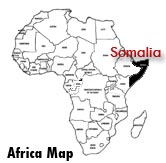Somali pirates reduce Saudi tanker ransom demand, move ship
 Mogadishu - Somali pirates have reduced their ransom demand for a hijacked Saudi supertanker to 15 million dollars and moved the ship after threats from an Islamist insurgent group, a local elder and an Islamist spokesman said Monday.
Mogadishu - Somali pirates have reduced their ransom demand for a hijacked Saudi supertanker to 15 million dollars and moved the ship after threats from an Islamist insurgent group, a local elder and an Islamist spokesman said Monday.
Pirates seized the Sirius Star, which is carrying a full load of crude oil worth 100 million dollars, around 830 kilometres south-east of the Kenyan port of Mombasa over a week ago.
They initially demanded that ship owner Saudi Aramco pay 25 million dollars by November 30 or face "disastrous action."
However, Sheikh Abdirahim Isse Adow, a spokesman for the Islamic Courts Union (ICU), told Deutsche Presse-Agentur dpa that the pirates had now cut their price to 15 million dollars.
Adow had previously warned that Islamist fighters who entered the port town of Harardhere, where the hijacked tanker anchored last Tuesday, would attack the pirates for seizing a ship from a Muslim country.
According to Harardhere elder Hussein Khaliif, the pirates have now moved the ship to avoid confrontation.
"Islamist forces in Harardhere put pressure on the pirates holding the Saudi oil tanker to move away from the town," he told dpa by phone. "The ship has disappeared into the high seas."
There was no information on the ship's new location.
The ICU, which alongside its extremist splinter group al-Shabaab is waging a bloody war against the government in southern and central Somalia, says it wants to stamp out piracy.
"We strongly oppose all pirates," Adow, a spokesman for the insurgents, told dpa on Saturday. "In our era there were no pirates in our waters. We will fight them when we get the chance."
Some analysts have said that the insurgents have links to the pirates, but both groups deny this. Piracy declined in 2006 during the ICU's brief period of control in Somalia.
The ICU was toppled with the help of Ethiopian troops, sparking a bloody insurgency that has only grown in ferocity. Now the Islamists are making huge gains and have advanced to the edge of the capital Mogadishu.
Piracy off the Horn of Africa nation has surged in recent months as Somalia descends further into chaos and the ineffectual central government continues to squabble rather than govern.
African Union Commission Chairman Jean Ping has said the instability in Somalia is feeding the rise in piracy.
While pirates on Saturday released the Greek-owned chemical tanker NV Genius and its 19 crew members, around 16 ships and over 300 seamen are still being held.
Another three ships were seized last week after the Sirius Star was taken. According to the International Maritime Bureau (IMB), there have been almost 100 attempts at piracy in the region this year, around 40 per cent of them successful.
Among the three ships was the Hong-Kong flagged Delight, which is operated by the Islamic Republic of Iran Shipping Lines.
Iranian Foreign Ministry Spokesman Hassan Ghashghavi said Monday that while Iran would rather continue talks, it did not rule out the use of force to free the ship.
The surge in piracy has prompted increased patrols by the North Atlantic Treaty Organization, Russia, the US-led coalition forces, India and France along the Somali coast.
The European Union has also authorized a force of between five and seven frigates, which is expected to arrive in the Gulf of Aden early December.
However, the increased naval presence has not deterred the pirates as they pursue huge ransoms, estimated at 30 million dollars so far this year.
Shipping firms and the international community are demanding firmer action against the pirates, and the Indian navy last week destroyed a pirate mothership for the first time.
Nonetheless, shipping companies are beginning to avoid the Gulf of Aden - a busy shipping channel which forms part of the route linking the Indian Ocean with the Mediterranean Sea through the Suez Canal.
Industry analysts say that this will drive up the cost of shipping as companies take the longer route round the Cape of Good Hope. (dpa)